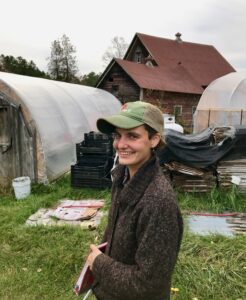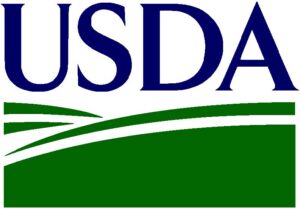Ansel Ploog manages Flywheel Farm in Woodbury, VT with Justin Cote where she grows organically certified vegetables and markets the produce wholesale and at their farmstand.
When Ansel started the farm in 2013, she had little farm management experience but a lot of ideas. Ansel says, “I quickly realized, with farming and dealing with living systems that you cannot get too attached to a plan.”
For many new farmers, there’s a temptation to diversify and do everything from specialty greens to on-farm animals. Keeping purchasing and sales records can help with decision-making. As Ansel says, “We liked the idea of a diversified farm with animals, so we had chickens for two years even though after the first winter we were thinking this isn’t a great idea. When we compared the amount of money going into feed, when the hens weren’t producing eggs, it became obvious that this was not going to work.”
Record-keeping – Keeping it Simple
Ansel’s approach to record keeping is to keep it simple and easy-to-use especially when the farm is in production. “Because record keeping happens during the season, I usually have other things I need to be doing. Also my hands are dirty so I can’t get on my phone and I’m not going to get on my computer. I neither have the time nor the brainpower to analyze things as they’re happening in the season. I can really just record.”
During the winter, Ansel creates a spreadsheet that lists crops, planting dates and information on seed varieties. She creates a master excel spreadsheets of all the farm’s crops, the varieties planted, and the seed specs such as seeding rates. This spreadsheet is a plan of what ‘should’ happen. Given the unpredictability of weather, markets, and other factors, Ansel developed a system to keep up with potential changes.
As Ansel describes, “When we create the production spreadsheet, it tells us when to plant, but it’s not a dead document. It gets photocopied and put in a plastic envelope so that I can write on it and record what actually happened. It’s been important to see both recording and planning parts of the farm together. In the past, I’ve had this production sheet on my computer and it’s in a nice excel spreadsheet of what we planned to do but doesn’t actually reflect what actually happened. Writing on on top of this production sheet has turned it into a record-keeping device rather than a planning device.”
Keeping Healthy
Without outside labor to rely on, Ansel and Justin take particular care of their physical sustainability and health. Ansel says, “It’s why we limit our hours on the farm and if things don’t get done, they don’t get done, within reason.”
“Then there’s the ecological system and sustainability and that’s almost the easiest because the plants know what they’re doing and this ecological system that we’re a part of is just trucking along doing its thing. Mostly, we just need to not get in the way and be as gently involved as possible.”
Being Adaptable
Ansel adds, “If we can learn to be adaptive, if we can have a general idea where we’re going and then figure out the way to get there according to what’s coming at us, we end up being happier and more successful. I think it’s a way of reducing anxiety and stress.”
“So being able to change our plans is important to us. It also allows us to be more creative on the spot.”









